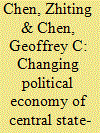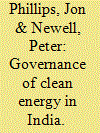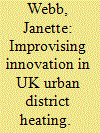|
|
|
Sort Order |
|
|
|
Items / Page
|
|
|
|
|
|
|
| Srl | Item |
| 1 |
ID:
178741


|
|
|
|
|
| Summary/Abstract |
This research seeks to reconceptualise the process of marketizing central state-owned enterprises (CSOEs) in the Chinese petroleum industry by interpreting their institutional establishment and reconstruction, and the change in their institutional context. The enterprise reform of state-owned oil companies, and the partial market liberalization initiated in the 1980s, have not pushed the petroleum sector toward the trajectory of the neoliberal free market. On the contrary, the state’s ascendency has been reconsolidated, and the institutional practice adhered to has made market-shaping possible. The state’s role is not fixed; rather, it has varied following the marketization process of the CSOEs. The state has reconstructed its role to strengthen its authority in the market, using market mechanisms to effectively improve its power to construct a flexible economic governance structure. In such a structure, where the state and market have mutually shaped each other, the combination of the two seemingly conflicting concepts of marketization and economic security has, to some degree, fostered the development of state-owned oil companies and expanded the scale of their asset-holding. The paper contributes to the broader discussion of state-market relationships and the institutionalization of energy governance with regard to China’s integration into the global capitalist economy.
|
|
|
|
|
|
|
|
|
|
|
|
|
|
|
|
| 2 |
ID:
126523


|
|
|
|
|
| Publication |
2013.
|
| Summary/Abstract |
The paper proposes two concepts to assess the effect of international regimes on energy security. Existing indicators focus mainly on state-level factors, excluding international influences. International relation scholars on the other hand see a clear connection between international regimes and stable energy relations. International regimes stabilise energy relations by providing frameworks for negotiations, defining, controlling and sanctioning compliance and allowing the actors to engage in package deals. The researcher needs to include these factors in a complete assessment of political energy security risks. As first step, the paper uses the effectiveness of control mechanisms as basis for such consideration. It refers specifically to international arbitration as the most important control mechanism in international energy relations. The simplest measurement option is the share of a county's energy imports covered by a certain regime. The paper applies the Oslo-Potsdam-Solution to account for outcome effectiveness. It applies a variant of the International Regimes Data Base protocol to account for effective regime structures. In a last section, the paper proposes some possible paths for future research.
|
|
|
|
|
|
|
|
|
|
|
|
|
|
|
|
| 3 |
ID:
149939


|
|
|
|
|
| Summary/Abstract |
Increasing the energy efficiency not only requires the improvement of current technologies, but also advancement of and more coherent institutional governance. This paper captures the major structural and organisational elements of institutional governance in place for promoting energy efficiency. Looking at Croatia – one of the most successful cases of energy efficiency programming of the past decade – the paper zooms in on governance coordination (metagovernance) between actors from different sectors and operating at multiple levels. By showcasing the positive implications of the programme, the authors contribute to the debate concerned with identifying better institutional frameworks to attain sustainable development. The programme showed effective governance through vertical and horizontal coordination among institutions and stakeholders resulting in simultaneous social and economic development and improved energy efficiency in public buildings. Through the case of Croatia, this study identifies how metagovernance has supported coordination among actors aiming to create sustainable development in general and how metagovernance functions in energy efficiency related projects, in particular. The paper also sheds light on communication frameworks of governance coordination and institutional constraints lying at the heart of the vagueness of sustainable development. It also discusses private sector involvement to achieve better institutional framework to attain sustainable development.
|
|
|
|
|
|
|
|
|
|
|
|
|
|
|
|
| 4 |
ID:
094902


|
|
|
|
|
| Publication |
2010.
|
| Summary/Abstract |
Soon after the launching of the Camisea Gas Project, in 2000, Peru became a medium-range Latin American gas exporting country. Our central argument is that energy governance in this country has been shifting from a "hierarchical" to a "co-governance" mode. Accordingly, interactions among the State, the society and economic actors are now regulated in a horizontal and decentralized way, rather than a vertical and centralized one. This shift contributed to the success of the Camisea gas project and had a positive effect on foreign direct investments inflow in the energy sector (1). In addition, it has helped Peru reach energetic self-sufficiency, while improving its energy balance (2). Meanwhile, energy policy has welcomed a major participation of social actors, contributing to institutionalized arrangements between the State, the companies and indigenous communities and their NGO partners (3). Two theoretical conclusions can be drawn from this study. First, the State's role remains central in energy governance, thus invalidating the "hollowing of the State" thesis. Second, the co-governance mode helps to overcome the "resource curse" thesis.
|
|
|
|
|
|
|
|
|
|
|
|
|
|
|
|
| 5 |
ID:
104971


|
|
|
|
|
| Publication |
2011.
|
| Summary/Abstract |
This article addresses the consequences of different modes of energy governance on the energy matrix. Energy governance is understood as a regulation system of the energy related interplays between the State, the society and the economy. The energy matrix is a useful instrument for comparative policy analysis, since it informs us about production and consumption trends, by sources and sectors. Our central argument is that energy governance follows two different patterns, one hierarchical and the other cooperative, that are not necessarily determined by the initial factors allocation, and produce different effects on the energy matrix. Hierarchical governance is based on centralized decision-making and State-centered development, while co-governance is based on decentralized decision-making and market-oriented development. To develop this argument, we compare the energy matrix from the five Andean countries (Venezuela, Colombia, Ecuador, Peru and Bolivia).
|
|
|
|
|
|
|
|
|
|
|
|
|
|
|
|
| 6 |
ID:
111433


|
|
|
|
|
| Publication |
2012.
|
| Summary/Abstract |
While a growing amount of literature has recently emerged describing network governance, less attention has been paid to evaluating the actual performance of networks. Our paper looks at the challenges facing network governance for natural resources (primarily logging and forestry) and energy (primarily renewable energy and energy efficiency) in Asia. The paper investigates what network governance is, and what types of challenges networks have to tackle. It then develops a qualitative analytical framework to evaluate the effectiveness of networks consisting of five criteria: (1) clarity of roles and objectives among members, (2) having strong, independent, continual sources of funding, (3) institutional formality (having a permanent secretariat, budget, full time staff, etc.), (4) efficacy (ability to accomplish its mission and goals at the least possible cost); and (5) level of interdependency among members. Finally, we apply this framework to four case studies: the Association of Southeast Asian Nations (ASEAN) Centre for Energy, Renewable Energy and Energy Efficiency Partnership (REEEP), ASEAN Regional Knowledge Network on Forests and Climate Change (FCC), and ASEAN Regional Knowledge Network on Forest Law Enforcement and Governance (FLEG). These cases illustrate effective (or ineffective) environmental and energy networks and the factors that are associated with network governance.
|
|
|
|
|
|
|
|
|
|
|
|
|
|
|
|
| 7 |
ID:
104435


|
|
|
|
|
| Publication |
2011.
|
| Summary/Abstract |
The global governance of extractive resources has largely been shaped by the energy-security agenda of industrialized countries. It is patchy and does not properly address the specific concerns of producer, consumer, and transit countries. Rising demand coincides with a looming peak of oil production and climate change. This requires urgent and resolute collective action, which is hampered by a disconnect between geological and political temporality and realities. Extractive industries, investors, civil society, international organizations, and consumer countries can jointly provide significant political and market incentives to avert the resource curse in resource-rich, but weak states. This calls for an appropriate institutionalization of voluntary multistakeholder initiatives with greater engagement on the part of emerging economies.
|
|
|
|
|
|
|
|
|
|
|
|
|
|
|
|
| 8 |
ID:
125454


|
|
|
|
|
| Publication |
2013.
|
| Summary/Abstract |
This paper explores the ways in which clean energy is being governed in India. It does so in order to improve our understanding of the potential and limitations of carbon finance in supporting lower carbon energy transitions, and to strengthen our appreciation of the role of politics in enabling or frustrating such endeavors. In particular we emphasize the importance of politics and the nature of India's political economy in understanding the development of energy sources and technologies defined as 'clean' both by the United Nations Clean Development Mechanism (CDM) and leading international actors. By considering the broad range of institutions that exert formal and informal political influence over how the benefits and costs of the CDM are distributed, the paper highlights shortcomings in the narrow way in which CDM governance has been conceptualized to date. This approach goes beyond analysis of technocratic aspects of governance - often reduced to a set of institutional design issues - in order to appreciate the political nature of the trade-offs that characterize debates about India's energy future and the relations of power which will determine how, and on whose terms, they are resolved.
|
|
|
|
|
|
|
|
|
|
|
|
|
|
|
|
| 9 |
ID:
137720


|
|
|
|
|
| Summary/Abstract |
Research on district heating has focused on technical-economic appraisal of its contribution to energy and carbon saving in urban centres. There is however lack of analysis of political and social processes which govern its actual take up. This paper examines these processes through a case study of Aberdeen, Scotland. Interviews and documentary analysis are used to examine the 2002 development of Aberdeen Heat and Power (AHP), an independent energy services company (ESCo). Technical-economic feasibility was a necessary component of appraisal, but not sufficient to govern decision-making. In the UK centralised energy market, DH investment is unattractive to commercial investors, and local authorities lack capacity and expertise in energy provision. In Aberdeen, the politics of fuel poverty converged with climate politics, creating an a-typical willingness to innovate through improvisation. The welfare priority resulted in creation of a non-profit locally-owned ESCo, using cost- rather than market-based heat tariffs. AHP has developed three combined heat and power energy centres and heat networks, supplying 34 MWh/pa of heat. Carbon savings are estimated to be 45% in comparison with electric heating, and heating costs are reduced by a similar amount. The conclusion outlines potential policy improvements.
|
|
|
|
|
|
|
|
|
|
|
|
|
|
|
|
| 10 |
ID:
105802


|
|
|
|
|
| Publication |
2011.
|
| Summary/Abstract |
Drawing from work on governance, this article explores four programs and policies that respond in some way to the challenges induced by climate change and modern energy use. Relying primarily on original data collected from research interviews and field research in seven countries along with four case studies, the article notes that polycentric approaches - those that mix scales (such as local/national or national/global), mechanisms (such as subsidies, tax credits, and mandates), and actors (such as government regulators, business stakeholders, and members of civil society) - can foster equity, inclusivity, information, accountability, organizational multiplicity, and adaptability that result in the resolution of climate and energy related problems. After explaining its case selection and research methods, defining climate and energy governance, and conceptualizing polycentrism, the study explores cases related to electricity supply in Denmark, ethanol production in Brazil, small-scale renewable energy in Bangladesh, and off-grid energy use in China. It concludes by highlighting how polycentrism may enhance effective climate and energy governance, but that further research is needed to fully substantiate that claim.
|
|
|
|
|
|
|
|
|
|
|
|
|
|
|
|
| 11 |
ID:
166434


|
|
|
|
|
| Summary/Abstract |
Malaysia's gas industry has been undergoing a profound transformation that is imperative in ensuring energy security. The rising demand especially in Peninsular Malaysia and regulating prices of natural gas saw PETRONAS selling natural gas at a relatively low price that affects the Government's revenue collection negatively. This article contextualised the changes in the law and policy that concerns the management of gas resources in Malaysia. The journey from a price regulated gas market towards a liberalised market is explained. This energy transition process requires more than changes in the law. It involves the synergy of dynamics from various aspects to ensure that the ecosystem is conducive for the development of a healthy natural gas sector to ensure secured energy supply, while catalysing the growth of new industries and generating new revenues for the nation. The challenges and pushbacks throughout this journey are highlighted. Discussions show how the problems were tackled strategically within the political, social and economic domains, as well as the interaction between them. These interactions demonstrate the importance of energy justice in policy making. Policy decisions are made to balance the competing goals of various key stakeholders.
|
|
|
|
|
|
|
|
|
|
|
|
|
|
|
|
| 12 |
ID:
100313


|
|
|
|
|
| Publication |
2010.
|
| Summary/Abstract |
Via an analysis of the trans-ASEAN gas pipeline project (TAGP), in this article we argue for a reconceptualising of the regional dynamics of Southeast Asia and the forces shaping them. For this task, we propose an analytical framework based upon social conflict theory that delves within and beyond the state, and which places emphasis upon the roles of both material and ideological factors operating across time in the reordering of particular geographical spaces. The framework reveals that the tensions acting within and upon ASEAN and the TAGP influence regionalism in such a way that the gas pipeline project - much like other 'regional' projects - is unlikely to ever come close to fulfilling its brief of enhancing regional security and cohesion. What is more probable is that the project's form will continue to be conditioned by entrenched politico-economic realities and the influence of dominant ideologies - factors which have the capacity to exacerbate existing regional animosities and disparities.
|
|
|
|
|
|
|
|
|
|
|
|
|
|
|
|
| 13 |
ID:
175903


|
|
|
|
|
| Summary/Abstract |
Electrification rates in sub-Saharan Africa are low despite increasing national and international efforts. Good governance is key to translate these efforts into tangible energy access improvements. However, evaluating the quality of energy access governance is challenging due to the multitude of stakeholders involved and its dynamic institutional environment. This paper designs a novel, holistic analytical approach to assess energy access governance based on three data collection methods: Qualitative Document Analysis (QDA), semi-structured stakeholder interviews and closed surveys. It assesses energy access governance along six indicators. Applying this approach to the previously unstudied cases of energy access governance in Uganda and Zambia allows us to induce a new model of the type of interdependencies between different indicators of good governance. It suggests that while a multitude of feedback loops between indicators exist, basic rule of law and transparency standards are critical prerequisites for accountability and inclusiveness, which in turn foster efficacy and, ultimately, responsiveness of energy access governance. For Uganda and Zambia specifically, our analyses reveal shortcomings across all six governance indicators, hampering electrification efforts. Key levers include completing regulatory frameworks, improving transparency, and designing meaningful interactions between stakeholders to foster inclusiveness, and responsiveness of energy access governance.
|
|
|
|
|
|
|
|
|
|
|
|
|
|
|
|
| 14 |
ID:
150880


|
|
|
|
|
| Summary/Abstract |
For a particular community, what energy-related innovations constitute no-regrets strategies? We present a methodology to understand how alternative energy consuming activities and policy regimes impact on current and future liveability of socio-culturally diverse communities facing climate change. Our methodology augments the energy policy literature by harnessing three concepts (collaborative governance, innovation and political economic regime of provisioning) to support dialogue around changing energy-related activities. We convened workshops in Alice Springs, Australia to build capability to identify no-regrets energy-related housing or transport activities and strategies. In preparation, we interviewed policy actors and constructed three new housing-related future scenarios. After discussing the scenarios, policy and research actors prioritised five socio-technical activities or strategies. Evaluations indicate participants enjoyed opportunities given by the methodology to have focussed discussions about activities and innovation, while requesting more socially nuanced scenario storylines. We discuss implications for theory and technique development.
|
|
|
|
|
|
|
|
|
|
|
|
|
|
|
|
| 15 |
ID:
092747


|
|
|
|
|
| Publication |
2009.
|
| Summary/Abstract |
This article conceptualizes the energy problems facing society from a global governance perspective. It argues that a notion of "global energy governance," taken to mean international collective action efforts undertaken to manage and distribute energy resources and provide energy services, offers a meaningful and useful framework for assessing energy-related challenges. The article begins by exploring the concepts of governance, global governance, and global energy governance. It then examines some of the existing institutions in place to establish and carry out rules and norms governing global energy problems and describes the range of institutional design options available to policymakers. It briefly traces the role of a selection of these institutions, from inter-governmental organizations to summit processes to multilateral development banks to global action networks, in responding to energy issues, and points out their strengths and weaknesses. The article concludes by analyzing how the various approaches to global governance differ in their applicability to addressing the conundrums of global energy problems.
|
|
|
|
|
|
|
|
|
|
|
|
|
|
|
|
|
|
|
|
|